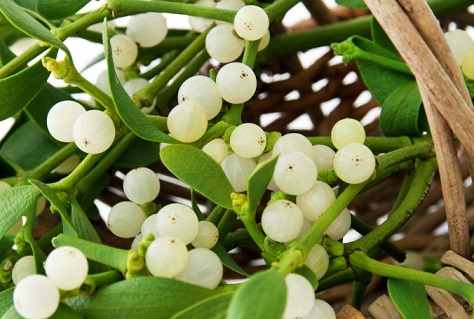Nikhil Prasad Fact checked by:Thailand Medical News Team Jan 08, 2025 3 months, 4 days, 21 hours, 3 minutes ago
Medical News:
A Novel Approach to Fight Triple-Negative Breast Cancer
Researchers from the College of Pharmacy and Research Institute of Life and Pharmaceutical Sciences at Sunchon National University, Republic of Korea, have made a breakthrough in the fight against one of the most aggressive forms of breast cancer. Their study explored the combined effects of Korean mistletoe lectin (Viscum album L. var. coloratum agglutinin, or VCA) and cisplatin on triple-negative breast cancer (TNBC) cells using innovative laboratory models.
 Mistletoe and Cisplatin Team Up Against Breast Cancer
Why Triple-Negative Breast Cancer is a Major Challenge
Mistletoe and Cisplatin Team Up Against Breast Cancer
Why Triple-Negative Breast Cancer is a Major Challenge
TNBC accounts for 15 - 20% of all breast cancer cases and is known for its aggressive behavior and poor prognosis. Unlike other breast cancers, it lacks three key receptors - estrogen, progesterone, and HER2 - which makes it resistant to standard hormonal therapies. This
Medical News report examines how the current study offers hope by combining conventional chemotherapy with natural compounds to target TNBC more effectively.
The Research Models and Key Findings
The team used MDA-MB-231 cells, a well-known TNBC cell line, to test their innovative treatment strategy. Two types of models were employed: traditional two-dimensional (2D) cultures and more advanced three-dimensional (3D) spheroid cultures. These 3D models better mimic the complex environment of actual tumors.
-Enhanced Cell Death: The combination of VCA and cisplatin showed remarkable synergistic effects, significantly reducing cell survival compared to either treatment alone. At high doses, cell viability dropped to as low as 24.6%.
-Induction of Apoptosis: Flow cytometry analyses revealed that the combined treatment induced apoptosis (programmed cell death) in up to 42.8% of cancer cells. This effect was supported by increased expression of pro-apoptotic proteins like Bax and cleaved caspase-3.
-Blocking Cell Division: The combination treatment arrested cancer cell cycles at the G2/M phase, a critical checkpoint before cells divide. This disruption halts tumor growth.
-Reduced Invasion and Migration: TNBC cells treated with VCA and cisplatin exhibited significantly reduced ability to invade surrounding tissues and migrate - key features of metastasis.
A Closer Look at the Molecular Mechanisms
The researchers delved into the molecular biology behind these results. Gene and protein analyses showed that the treatment impacted key pathways:
- Pathways: The Bax/Bcl-2 ratio, a marker of cell death, increased threefold under high-dose combination therapy.
-Anti-Metastatic Effects: Markers for metastasis, such as MMP-2 and MMP-9, were significantly downregulated, indicating reduced tumor spread potential.
t;-Epithelial-Mesenchymal Transition (EMT) Reversal: EMT, a process that enhances cancer's ability to invade and resist treatment, was partially reversed. E-cadherin (a marker of non-invasive cells) was upregulated, while N-cadherin and vimentin (markers of aggressive cancer) were downregulated.
Why This Study Stands Out
Unlike traditional studies limited to 2D models, this research highlighted the importance of 3D cultures. These models revealed nuances in drug sensitivity and interactions that 2D studies might miss. For example, 3D cultures showed stronger anti-migration and anti-invasion effects, emphasizing their value in preclinical testing.
Conclusions and Future Implications
This study provides compelling evidence that combining VCA and cisplatin offers a promising new avenue for TNBC treatment. The findings highlight the need to integrate natural compounds with conventional therapies to tackle drug resistance and tumor heterogeneity. Importantly, the study underscores the value of using advanced models like 3D cultures for more accurate predictions of treatment efficacy.
As cancer treatments evolve, strategies that leverage both natural and synthetic agents could pave the way for more personalized and effective approaches. While further clinical trials are necessary, this research offers hope for patients facing TNBC's daunting challenges.
The study findings were published in the peer-reviewed International Journal of Molecular Sciences.
https://www.mdpi.com/1422-0067/26/1/366
For the latest on Breast Cancer, keep on logging to Thailand Medical News.
Read Also:
https://www.thailandmedical.news/news/scientists-discover-ext1-as-a-new-key-biomarker-in-breast-cancer
https://www.thailandmedical.news/news/epigenetic-role-of-endocrine-disruptors-in-breast-cancer
https://www.thailandmedical.news/news/triple-viral-infections-and-breast-cancer
https://www.thailandmedical.news/news/promising-advances-in-breast-cancer-treatment-targeting-glutamine-metabolism
https://www.thailandmedical.news/news/new-study-links-glucocorticoid-receptor-types-to-breast-cancer-outcomes,-paving-the-way-for-personalized-treatments
